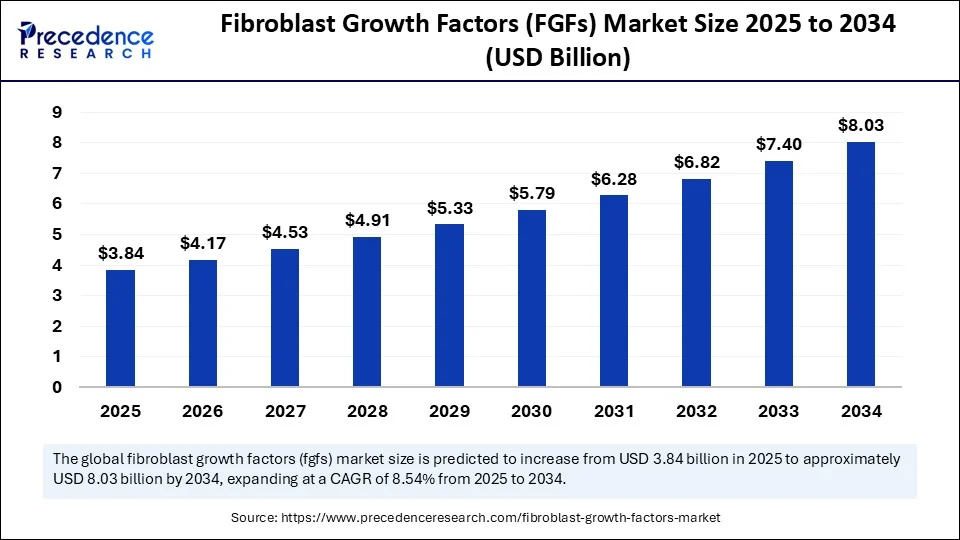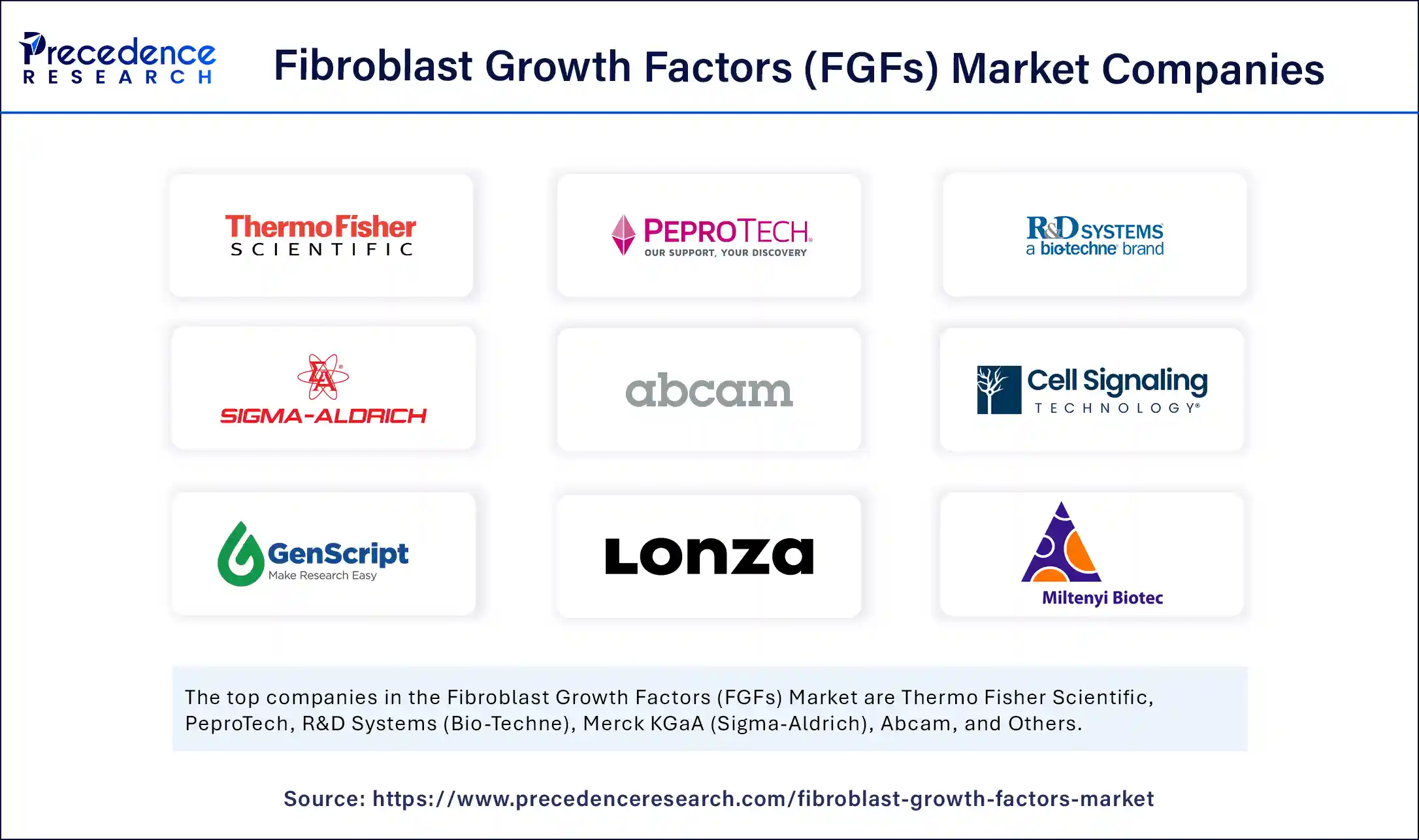
The Fibroblast Growth Factors (FGFs) Market is a rapidly expanding segment focused on the development of biologics for tissue regeneration and cellular repair. The Global Fibroblast Growth Factors Market encompasses applications across oncology, wound care, and cosmetic treatments. Continuous advancements in biotechnological processes and increasing clinical validation have driven significant market expansion. Increasing collaborations among research institutions and pharmaceutical companies further propel the global reach of FGFs-based therapies.
AI and Innovation
Artificial intelligence is increasingly integrated into the Fibroblast Growth Factors (FGFs) Market to enhance drug discovery and personalized treatment strategies. The Global Fibroblast Growth Factors Market benefits from AI algorithms that analyze patient-specific data to predict efficacy and adverse reactions. Innovation in this market includes development of controlled-release systems and bioengineered FGFs analogs that improve therapeutic stability. These innovations lead to more effective treatments and optimized manufacturing workflows.
Future Trends of Market
Future trends in the Fibroblast Growth Factors (FGFs) Market focus on combining FGFs with gene therapies and advanced biomaterials for improved tissue engineering. The Global Fibroblast Growth Factors Market is poised to witness growth through personalized regenerative medicine and sustainable production technologies. Expansion into new therapeutic indications such as cardiovascular and neurological diseases is anticipated. Additionally, increasing consumer demand for FGFs in anti-aging products supports market growth.
Rising Demands of Market
Rising demand in the Fibroblast Growth Factors (FGFs) Market is driven by an increase in chronic diseases, aging populations, and greater adoption of regenerative therapies. The Global Fibroblast Growth Factors Market sees growing use of FGFs in both clinical and cosmetic settings. Awareness campaigns and improved healthcare access contribute to higher patient acceptance. Demand for minimally invasive treatments that utilize FGFs continues to rise across various medical specialties.
Key Market Highlights
Key highlights in the Fibroblast Growth Factors (FGFs) Market include new product launches and increasing clinical trial activity worldwide. The Global Fibroblast Growth Factors Market experiences growing investments from venture capital and governmental agencies focused on regenerative medicine. Partnerships between biopharma companies and technology providers enhance innovation capabilities. Market expansion efforts include diversifying applications and geographic outreach.
Market Growth Drivers
Growth in the Fibroblast Growth Factors (FGFs) Market is fueled by rising incidences of tissue injuries and degenerative conditions globally. The Global Fibroblast Growth Factors Market benefits from breakthroughs in protein engineering and drug delivery platforms. Supportive government initiatives and increasing healthcare spending boost market prospects. The demand for personalized and effective treatments is a critical growth driver.
Restraints
Challenges in the Fibroblast Growth Factors (FGFs) Market include high costs of biologic drugs and complexity in manufacturing processes. The Global Fibroblast Growth Factors Market faces regulatory scrutiny and potential safety concerns regarding long-term use. Market growth is also limited by the lack of widespread clinical evidence in some therapeutic areas. Additionally, infrastructure gaps in developing regions restrict market penetration.
Opportunities
Opportunities in the Fibroblast Growth Factors (FGFs) Market are vast, especially in emerging markets where investment in healthcare is growing rapidly. The Global Fibroblast Growth Factors Market can capitalize on advancements in nanotechnology and synthetic biology for improved drug design. Expanding cosmetic and dermatological applications present additional growth avenues. Collaborative innovation between academia and industry remains a key opportunity for market advancement.
Also Read@ https://www.pharma-geek.com/dehydration-monitoring-devices-market/
Fibroblast Growth Factors (FGFs) Market Companies

- Thermo Fisher Scientific
- PeproTech
- R&D Systems (Bio-Techne)
- Merck KGaA (Sigma-Aldrich)
- Abcam
- Cell Signaling Technology
- GenScript Biotech
- Lonza Group
- Miltenyi Biotec
- FUJIFILM Wako Pure Chemical
- 89bio Inc.
- Akero Therapeutics
- MedChemExpress
- Proteintech Group
- Novartis (FGF-targeted oncology pipelines)
- Bristol-Myers Squibb (FGF-linked therapies)
- Elabscience Biotech
- ACROBiosystems
- Genscript’s custom CDMO FGF services
- Stem-cell culture suppliers integrating FGFs (e.g., STEMCELL Technologies)
Leaders’ Announcements
- In February 2024, HUTCHMED announced that Inmagene Biopharmaceuticals licensed two drug candidates for immunological diseases, enabling their further development, manufacture, and worldwide commercialization. HUTCHMED’s CEO, Dr. Weiguo Su, highlighted this as validation of their research and development efforts and a testament to their collaborative approach in advancing innovative drug candidates.
- In September 2023, Kriya Therapeutics acquired Tramontane Therapeutics, gaining a portfolio of Fibroblast Growth Factor 21 (FGF21) assets aimed at treating metabolic and neurodegenerative diseases. Kriya views the one-time adeno-associated virus (AAV) gene therapy for FGF21 as a promising treatment approach for non-alcoholic steatohepatitis (NASH), demonstrating strong efficacy in animal models, including a single-dose gene therapy candidate for insulin.
Recent Developments
- In November 2024, Eisai Co., Ltd. launched TASFYGO® Tablets 35 mg (tasurgratinib succinate) in Japan for patients with unresectable biliary tract cancer possessing FGFR2 gene fusions who have progressed after chemotherapy. TASFYGO is an orally available tyrosine kinase inhibitor that selectively targets FGFR1, FGFR2, and FGFR3. A companion diagnostic test, the AmoyDx® FGFR2 Break-apart FISH Probe Kit, was approved in August 2024.
- In August 2024, Taiho Oncology Europe GmbH introduced Lytgobi® (futibatinib) in France for adult patients with locally advanced or metastatic cholangiocarcinoma with FGFR2 fusions who have not responded to previous therapies. Dr. Antoine Hollebecque described it as a meaningful advancement in treating this difficult condition, as the medication targets one of the most common underlying genomic alterations observed in cholangiocarcinoma.
Get Sample Link@ https://www.precedenceresearch.com/sample/6596
- Estrogen Replacement Therapy Market Size to Reach USD 19.46 Billion by 2034 - September 18, 2025
- Peptide Therapeutics CDMO Market Report Size, Share & Forecast 2034 - September 17, 2025
- Rare Musculoskeletal Disorder Treatments Market Size, Share & Future Trends 2034 - September 17, 2025
